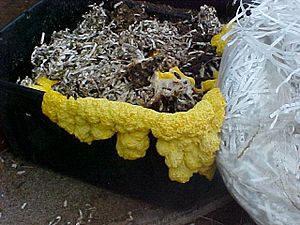Biodegradation facts for kids

Biodegradation is a natural process where tiny living things, like bacteria and fungi, break down materials. Think of it like nature's recycling system! When something is biodegradable, it means these tiny helpers can eat it up and turn it back into simple, natural stuff.
This process is super important for our planet. It helps keep our environment clean and manages waste. Things that biodegrade are often called environmentally friendly. This is because they don't stay around forever, but instead return to the earth.
Materials that come from plants and animals are called organic materials. These can break down in two main ways:
- Aerobic: This happens when there is oxygen present.
- Anaerobic: This happens when there is no oxygen.
Even some man-made or inorganic materials can biodegrade. Scientists can even find special tiny living things that are good at breaking down these specific materials.
In nature, different things break down at different speeds. Most of the tiny living things that help with biodegradation need certain conditions. They need light, heat, water, and oxygen to do their job well.
How Long Does It Take to Biodegrade?
This table shows how long some common items might take to break down in the ocean. You can see that natural items break down much faster than man-made ones like plastic or glass.
| Product | Time to biodegrade |
|---|---|
| Apple core | 1–2 months |
| General paper | 1–3 months |
| Paper towel | 2–4 weeks |
| Cardboard box | 2 months |
| Cotton cloth | 5 months |
| Plastic coated milk carton | 5 years |
| Wax coated milk carton | 3 months |
| Tin cans | 50–100 years |
| Aluminium cans | 150–200 years |
| Glass bottles | Undetermined (forever) |
| Plastic bags | 10–20 years |
| Soft plastic (bottle) | 100 years |
| Hard plastic (bottle cap) | 400 years |
Related pages
Images for kids
 | Delilah Pierce |
 | Gordon Parks |
 | Augusta Savage |
 | Charles Ethan Porter |

